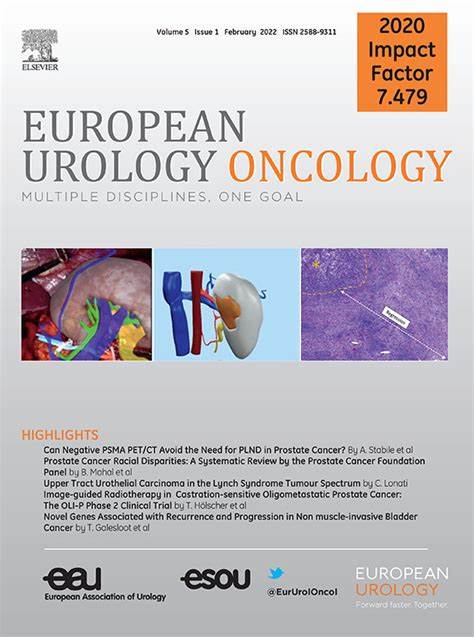Comparison of Pathologist and Artificial Intelligence–based Grading for Prediction of Metastatic Outcomes After Radical Prostatectomy
IF 8.3
1区 医学
Q1 ONCOLOGY
引用次数: 0
Abstract
Gleason grade group (GG) is the most powerful prognostic variable in localized prostate cancer; however, interobserver variability remains a challenge. Artificial intelligence algorithms applied to histopathologic images standardize grading, but most have been tested only for agreement with pathologist GG, without assessment of performance with respect to oncologic outcomes. We compared deep learning–based and pathologist-based GGs for an association with metastatic outcome in three surgical cohorts comprising 777 unique patients. A digitized whole slide image of the representative hematoxylin and eosin–stained slide of the dominant tumor nodule was assigned a GG by an artificial intelligence–based grading algorithm and was compared with the GG assigned by a contemporary pathologist or the original pathologist-assigned GG for the entire prostatectomy. Harrell’s C-indices based on Cox models for time to metastasis were compared. In a combined analysis of all cohorts, the C-index for the artificial intelligence–assigned GG was 0.77 (95% confidence interval [CI]: 0.73–0.81), compared with 0.77 (95% CI: 0.73–0.81) for the pathologist-assigned GG. By comparison, the original pathologist-assigned GG for the entire case had a C-index of 0.78 (95% CI: 0.73–0.82).
Patient summary
Artificial intelligence–enabled prostate cancer grading on a single slide was comparable with pathologist grading for predicting metastatic outcome in men treated by radical prostatectomy, enabling equal access to expert grading in lower resource settings.
病理学家和人工智能分级在预测前列腺癌根治术后转移性结果方面的比较。
格里森分级组(GG)是局部前列腺癌最有力的预后变量;然而,观察者之间的差异仍然是一个挑战。应用于组织病理学图像的人工智能算法可以实现分级标准化,但大多数算法只测试了与病理学家 GG 的一致性,而没有评估与肿瘤结果相关的性能。我们在由 777 名患者组成的三个手术队列中比较了基于深度学习的 GG 和基于病理学家的 GG 与转移性结果的关联性。基于人工智能的分级算法为主要肿瘤结节的苏木精和伊红染色玻片的数字化全片图像分配了一个 GG,并与当代病理学家分配的 GG 或病理学家为整个前列腺切除术分配的原始 GG 进行了比较。同时还比较了基于 Cox 模型的哈雷尔 C 指数对转移时间的影响。在对所有队列进行的综合分析中,人工智能分配的 GG 的 C 指数为 0.77(95% 置信区间 [CI]:0.73-0.81),而病理学家分配的 GG 的 C 指数为 0.77(95% 置信区间 [CI]:0.73-0.81)。相比之下,病理学家最初为整个病例指定的 GG 的 C 指数为 0.78(95% CI:0.73-0.82)。患者总结:在预测根治性前列腺切除术男性患者的转移预后方面,人工智能支持的单张切片前列腺癌分级与病理学家分级结果相当,这使得在资源较少的情况下也能平等地获得专家分级结果。
本文章由计算机程序翻译,如有差异,请以英文原文为准。
求助全文
约1分钟内获得全文
求助全文
来源期刊

European urology oncology
Multiple-
CiteScore
15.50
自引率
2.40%
发文量
128
审稿时长
20 days
期刊介绍:
Journal Name: European Urology Oncology
Affiliation: Official Journal of the European Association of Urology
Focus:
First official publication of the EAU fully devoted to the study of genitourinary malignancies
Aims to deliver high-quality research
Content:
Includes original articles, opinion piece editorials, and invited reviews
Covers clinical, basic, and translational research
Publication Frequency: Six times a year in electronic format
 求助内容:
求助内容: 应助结果提醒方式:
应助结果提醒方式:


